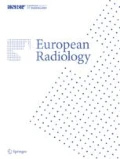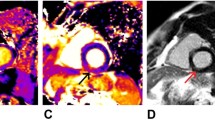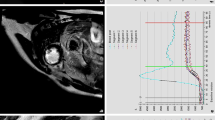Abstract
The aim of this study was to analyze the diagnostic accuracy of edema on T2-weighted (T2w) cardiac magnetic resonance imaging (CMR), presence of microvascular obstruction (MO) on first-pass enhancement (FPE) or on delayed enhancement (DE) CMR, and wall thinning on cine CMR to differentiate between acute (AMI) and chronic myocardial infarction (CMI) in patients with infarction on DE-CMR. Fifty patients were imaged 5 ± 3 days (baseline) and 8 ± 3 months (follow-up) after AMI at 1.5 T. Imaging findings were graded as present or absent in a blinded consensus reading. Edema was present at baseline in 48 (96%) patients and absent at follow-up in 49 (98%) patients. At baseline, MO was present in 29 (58%) patients on FPE-CMR and in 24 (48%) patients on DE-CMR (P = ns). At follow-up, persisting hypoenhancement was observed in ten (20%) patients on FPE-CMR, whereas two (4%) patients showed persisting hypoenhancement on DE-CMR (P<0.05). Wall thinning was present in 4 (8%) patients at baseline and in 20 (40%) patients at follow-up. Edema had high sensitivity (96%), specificity (98%), and accuracy (97%) to differentiate between AMI and CMI. Accuracy of all other imaging findings was lower compared to that of edema (P<0.001). In the presence of infarction on DE-CMR, T2w-CMR reliably differentiates between AMI and CMI.



Similar content being viewed by others
References
Judd RM, Lugo-Olivieri CH, Arai M, Kondo T, Croisille P, Lima JA, Mohan V, Becker LC, Zerhouni EA (1995) Physiological basis of myocardial contrast enhancement in fast magnetic resonance images of 2-day-old reperfused canine infarcts. Circulation 92:1902–1910
Kim RJ, Wu E, Rafael A, Chen EL, Parker MA, Simonetti O, Klocke FJ, Bonow RO, Judd RM (2000) The use of contrast-enhanced magnetic resonance imaging to identify reversible myocardial dysfunction. N Engl J Med 343:1445–1453
Saeed M, Lund G, Wendland MF, Bremerich J, Weinmann H, Higgins CB (2001) Magnetic resonance characterization of the peri-infarction zone of reperfused myocardial infarction with necrosis-specific and extracellular nonspecific contrast media. Circulation 103:871–876
Klein C, Nekolla SG, Bengel FM, Momose M, Sammer A, Haas F, Schnackenburg B, Delius W, Mudra H, Wolfram D, Schwaiger M (2002) Assessment of myocardial viability with contrast-enhanced magnetic resonance imaging: comparison with positron emission tomography. Circulation 105:162–167
Lund GK, Stork A, Saeed M, Bansmann MP, Gerken JH, Muller V, Mester J, Higgins CB, Adam G, Meinertz T (2004) Acute myocardial infarction: evaluation with first-pass enhancement and delayed enhancement MR imaging compared with 201Tl SPECT imaging. Radiology 232:49–57
Saeed M, Lee RJ, Weber O, Do L, Martin A, Ursell P, Saloner D, Higgins CB (2006) Scarred myocardium imposes additional burden on remote viable myocardium despite a reduction in the extent of area with late contrast MR enhancement. Eur Radiol 16:827–836
Abdel-Aty H, Zagrosek A, Schulz-Menger J, Taylor AJ, Messroghli D, Kumar A, Gross M, Dietz R, Friedrich MG (2004) Delayed enhancement and T2-weighted cardiovascular magnetic resonance imaging differentiate acute from chronic myocardial infarction. Circulation 109:2411–2416
DiBona DR, Powell WJ Jr (1980) Quantitative correlation between cell swelling and necrosis in myocardial ischemia in dogs. Circ Res 47:653–665
Jennings RB, Schaper J, Hill ML, Steenbergen C Jr, Reimer KA (1985) Effect of reperfusion late in the phase of reversible ischemic injury. Changes in cell volume, electrolytes, metabolites, and ultrastructure. Circ Res 56:262–278
Simonetti OP, Finn JP, White RD, Laub G, Henry DA (1996) “Black blood” T2-weighted inversion-recovery MR imaging of the heart. Radiology 199:49–57
Lim TH, Hong MK, Lee JS, Mun CW, Park SJ, Park SW, Ryu JS, Lee JH, Chien D, Laub G (1997) Novel application of breath-hold turbo spin-echo T2 MRI for detection of acute myocardial infarction. J Magn Reson Imaging 7:996–1001
Miller S, Helber U, Kramer U, Hahn U, Carr J, Stauder NI, Hoffmeister HM, Claussen CD (2001) Subacute myocardial infarction: assessment by STIR T2-weighted MR imaging in comparison to regional function. MAGMA 13:8–14
Stork A, Lund GK, Muellerleile K, Bansmann M, Nolte-Ernsting C, Kemper J, Begemann PGC, Adam G (2006) Characterization of the peri-infarction zone using T2-weighted MRI and delayed-enhancement MRI in patients with acute myocardial infarction. Eur Radiol DOI 10.1007/s00330-006-0232-3
Schulz-Menger J, Gross M, Messroghli D, Uhlich F, Dietz R, Friedrich MG (2003) Cardiovascular magnetic resonance of acute myocardial infarction at a very early stage. J Am Coll Cardiol 42:513–518
Kloner RA, Ganote CE, Jennings RB (1974) The “no-reflow” phenomenon after temporary coronary occlusion in the dog. J Clin Invest 54:1496–1508
Rochitte CE, Lima JA, Bluemke DA, Reeder SB, McVeigh ER, Furuta T, Becker LC, Melin JA (1998) Magnitude and time course of microvascular obstruction and tissue injury after acute myocardial infarction. Circulation 98:1006–1014
Wu KC, Zerhouni EA, Judd RM, Lugo-Olivieri CH, Barouch LA, Schulman SP, Blumenthal RS, Lima JA (1998) Prognostic significance of microvascular obstruction by magnetic resonance imaging in patients with acute myocardial infarction. Circulation 97:765–772
Kaul S, Ito H (2004) Microvasculature in acute myocardial ischemia: part II: evolving concepts in pathophysiology, diagnosis, and treatment. Circulation 109:310–315
Eeckhout E, Kern MJ (2001) The coronary no-reflow phenomenon: a review of mechanisms and therapies. Eur Heart J 22:729–739
Reiner JS, Lundergan CF, Fung A, Coyne K, Cho S, Israel N, Kazmierski J, Pilcher G, Smith J, Rohrbeck S, Thompson M, Van de Werf F, Ross AM (1996) Evolution of early TIMI 2 flow after thrombolysis for acute myocardial infarction. GUSTO-1 Angiographic Investigators. Circulation 94:2441–2446
Neumann FJ, Blasini R, Schmitt C, Alt E, Dirschinger J, Gawaz M, Kastrati A, Schomig A (1998) Effect of glycoprotein IIb/IIIa receptor blockade on recovery of coronary flow and left ventricular function after the placement of coronary-artery stents in acute myocardial infarction. Circulation 98:2695–2701
Baer FM, Smolarz K, Jungehulsing M, Beckwilm J, Theissen P, Sechtem U, Schicha H, Hilger HH (1992) Chronic myocardial infarction: assessment of morphology, function, and perfusion by gradient echo magnetic resonance imaging and 99mTc-methoxyisobutyl-isonitrile SPECT. Am Heart J 123:636–645
Stehling MK, Holzknecht NG, Laub G, Bohm D, von Smekal A, Reiser M (1996) Single-shot T1- and T2-weighted magnetic resonance imaging of the heart with black blood: preliminary experience. MAGMA 4:231–240
Whalen DA Jr, Hamilton DG, Ganote CE, Jennings RB (1974) Effect of a transient period of ischemia on myocardial cells. I. Effects on cell volume regulation. Am J Pathol 74:381–397
Garcia-Dorado D, Oliveras J, Gili J, Sanz E, Perez-Villa F, Barrabes J, Carreras MJ, Solares J, Soler-Soler J (1993) Analysis of myocardial oedema by magnetic resonance imaging early after coronary artery occlusion with or without reperfusion. Cardiovasc Res 27:1462–1469
Nilsson JC, Nielsen G, Groenning BA, Fritz-Hansen T, Sondergaard L, Jensen GB, Larsson HB (2001) Sustained postinfarction myocardial oedema in humans visualised by magnetic resonance imaging. Heart 85:639–642
Krauss XH, van der Wall EE, van der Laarse A, Doornbos J, de Roos A, Matheijssen NA, van Dijkman PR, van Voorthuisen AE, Bruschke AV (1990) Follow-up of regional myocardial T2 relaxation times in patients with myocardial infarction evaluated with magnetic resonance imaging. Eur J Radiol 11:110–119
Hombach V, Grebe O, Merkle N, Waldenmaier S, Hoher M, Kochs M, Wohrle J, Kestler HA (2005) Sequelae of acute myocardial infarction regarding cardiac structure and function and their prognostic significance as assessed by magnetic resonance imaging. Eur Heart J 26:549–557
Stone GW, Grines CL, Cox DA, Garcia E, Tcheng JE, Griffin JJ, Guagliumi G, Stuckey T, Turco M, Carroll JD, Rutherford BD, Lansky AJ (2002) Comparison of angioplasty with stenting, with or without abciximab, in acute myocardial infarction. N Engl J Med 346:957–966
Olivari Z, Rubartelli P, Piscione F, Ettori F, Fontanelli A, Salemme L, Giachero C, Di Mario C, Gabrielli G, Spedicato L, Bedogni F (2003) Immediate results and one-year clinical outcome after percutaneous coronary interventions in chronic total occlusions: data from a multicenter, prospective, observational study (TOAST-GISE). J Am Coll Cardiol 41:1672–1678
Author information
Authors and Affiliations
Corresponding author
Additional information
This study was funded in part by the Pinguin-Stiftung, Düsseldorf, Germany and by the Schering Company, Berlin, Germany.
Rights and permissions
About this article
Cite this article
Stork, A., Muellerleile, K., Bansmann, P.M. et al. Value of T2-weighted, first-pass and delayed enhancement, and cine CMR to differentiate between acute and chronic myocardial infarction. Eur Radiol 17, 610–617 (2007). https://doi.org/10.1007/s00330-006-0460-6
Received:
Revised:
Accepted:
Published:
Issue Date:
DOI: https://doi.org/10.1007/s00330-006-0460-6




